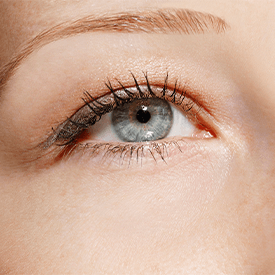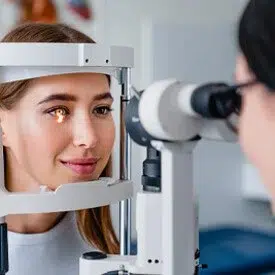Diabetic Eye Care in Lake Worth, FL
What Is Diabetic Eye Care?
Diabetes can have a serious impact on your overall health, including your eye health and vision, which is why proactive care matters. Without regular diabetic eye exams, patients face a higher risk of developing conditions such as cataracts, glaucoma, diabetic macular edema, and diabetic retinopathy, all of which affect the blood vessels inside the eye and can threaten long-term eyesight. When left untreated, these diabetes-related eye diseases may lead to partial or even permanent vision loss. For individuals living with type 1 or type 2 diabetes, partnering with an experienced eye doctor is essential for early detection and ongoing management. During a comprehensive eye evaluation, our ophthalmologists in Lake Worth, FL focus on identifying changes early, monitoring disease progression, and helping control complications before they become severe. Proudly serving patients throughout Lake Worth, FL, and Delray Beach, FL, the team at Palm Beach Eye Center offers specialized diabetic eye care designed to protect your vision at every stage. Schedule an appointment with our diabetic eye care specialists to learn how routine monitoring and personalized treatment can help safeguard your eyesight.
What Are the Benefits of Diabetic Eye Care?
Diabetic eye care plays a vital role in preserving long-term vision and reducing the risk of diabetes-related eye conditions. Ongoing eye exams and proactive monitoring help identify changes early and support healthier outcomes for patients managing diabetes. Key benefits of consistent diabetic eye care include:
- Early detection of diabetes-related eye changes, including diabetic retinopathy and macular swelling
- Lower risk of vision loss through timely treatment and monitoring
- Improved management of diabetic eye disease, helping slow progression over time
- Better overall eye health, supporting clearer vision and long-term eye function
- Stronger connection between eye health and diabetes management, reinforcing whole-body wellness
What Are Symptoms of Diabetic Eye Disease?
Persistently elevated blood sugar levels can gradually damage the delicate blood vessels in the eyes, leading to serious and sometimes irreversible vision problems. When glucose levels remain uncontrolled, these vessels may swell, weaken, or leak fluid into the eye, increasing internal eye pressure and raising the risk of scarring and permanent vision impairment. For patients managing diabetes, routine eye exams play a critical role in protecting long-term vision. Scheduling regular visits with our diabetic eye specialists in Lake Worth, FL allows changes in eye health to be identified early, before significant damage occurs. Many forms of diabetic eye disease progress silently, often showing no noticeable symptoms until vision is already affected. Some of the most common warning signs associated with diabetes-related eye conditions include:
- Vision loss or noticeable changes in eyesight
- Reduced vision or difficulty focusing
- Dark spots or shadows within the visual field
- Floaters that drift across your vision
- Photopsia, or flashes of light in peripheral vision
- Color vision changes, including deuteranopia
If you have diabetes and notice any changes in your eyesight, connecting with our experienced eye doctor for diabetic patients in Delray Beach, FL can help ensure early diagnosis and personalized care.
What Causes Diabetic Eye Disease?
Diabetic eye disease develops when chronically high blood sugar levels begin to weaken and damage the delicate blood vessels inside the retina, interfering with normal vision over time. This process leads to diabetic retinopathy, the leading cause of diabetes-related vision loss, where blood vessels may leak, swell, or become blocked. Diabetes can also trigger diabetic macular edema, a condition in which excess fluid builds up in the macula and affects sharp central vision needed for reading and recognizing faces. Fluctuating glucose levels may cause the eye’s natural lens to swell, resulting in blurry vision from diabetic cataracts that can progress faster than age-related cataracts. In addition, people with diabetes face a higher risk of glaucoma, a serious optic nerve disease often linked to elevated eye pressure that can lead to permanent vision damage if left untreated.
What Are the Risk Factors for Diabetic Eye Disease?
A range of health and lifestyle factors can raise your risk of developing diabetic eye disease, especially when diabetes is not carefully managed over time. Understanding these risks can help support early detection of diabetic eye disease and protect long-term eye health.
- Duration of diabetes: The longer someone lives with diabetes, the greater the chance of developing diabetic eye complications, including diabetic retinopathy.
- Poor blood sugar control: Ongoing high blood sugar levels can damage the delicate blood vessels in the retina, leading to vision-related complications.
- High blood pressure: Uncontrolled hypertension can accelerate retinal damage and increase the severity of diabetes-related eye disease.
- High cholesterol: Elevated cholesterol may worsen retinal changes and contribute to the progression of diabetic vision problems.
- Pregnancy: Hormonal shifts during pregnancy can temporarily intensify diabetic eye disease in women with pre-existing diabetes, making eye exams for diabetics especially important.
- Smoking: Tobacco use reduces blood flow and can speed up damage linked to diabetic retinopathy and vision loss.
- Obesity: Excess weight is associated with poor metabolic control, which raises the risk of diabetes complications affecting the eyes.
Being aware of these factors highlights why regular diabetic eye exams, lifestyle management, and ongoing medical care play a key role in preserving clear vision and reducing long-term eye damage.
Who is an ideal candidate for diabetic eye care?
A strong candidate for diabetic eye care includes anyone who has been newly diagnosed with diabetes or individuals managing diabetes who have not had a comprehensive eye exam within the past year. Scheduling an appointment is especially important if you notice changes such as blurred vision, eye floaters, dark spots in your vision, difficulty seeing colors, or other diabetic vision changes. Our eye doctor for diabetic patients in Delray Beach, FL focuses on early detection and personalized care to support long-term eye health, slow the progression of diabetic eye disease, and protect your remaining vision. With proactive monitoring and tailored treatment options, our team helps patients stay ahead of complications like diabetic retinopathy and other diabetes-related eye conditions. To learn more about how diabetes affects your eyes and why routine diabetic eye exams matter, schedule an appointment with our experienced team today.
How Are Diabetic Eye Conditions Managed?
At Palm Beach Eye Center, our experienced team of eye doctors for diabetic patients in Delray Beach, FL provides comprehensive annual diabetic eye exams designed to protect long-term eye health and lower the risk of diabetes-related vision loss. These visits often include advanced diagnostic eye testing to closely evaluate how diabetes may be affecting your vision. Eye dilation is commonly used so our doctors can carefully examine the retina, optic nerve, and other internal eye structures for early signs of diabetic retinopathy, macular swelling, or circulation changes. Depending on your needs, a tonometry test may also be performed to measure intraocular pressure, helping identify concerns such as glaucoma in diabetic patients. Visual acuity testing is used to create a clear baseline and monitor changes in vision over time, allowing our team to spot issues early. If a diabetic eye condition is detected, your personalized care plan may include prescription medications, therapeutic eye injections, laser eye treatments, or other targeted procedures aimed at preserving vision and supporting ongoing eye health
Does Insurance Cover Diabetic Eye Care?
Most insurance plans, including Medicare and many private health insurers, typically cover at least a portion of diabetic eye care when visits are considered medically necessary, such as for routine diabetic eye exams or ongoing monitoring of diabetic retinopathy. Coverage details can differ based on your individual policy, including deductibles, copays, and whether you are seeing an in-network eye doctor. At Palm Beach Eye Center, our knowledgeable team regularly works with insurance providers to help patients navigate insurance coverage for diabetic eye exams, including Medicare diabetic eye exam benefits. We verify your benefits ahead of time and clearly explain any out-of-pocket costs, so there are no surprises. Our goal is to make diabetic retinopathy screening and ongoing eye health care straightforward, affordable, and stress-free while ensuring your vision gets the consistent attention it deserves.
Diabetic Eye Care FAQ
What types of eye problems are caused by diabetes?
Diabetes increases the risk of several serious eye conditions that can impact long-term vision and overall diabetic eye health. People with diabetes are more likely to develop diabetes-related eye disease, including diabetic retinopathy, diabetic macular edema, cataracts, and glaucoma. These conditions develop when prolonged high blood sugar damages blood vessels in the eyes, particularly the retina, making early detection essential for protecting vision.
Can you reverse vision loss from diabetes?
In most cases, vision loss linked to diabetes is caused by diabetic retinopathy, a condition that damages the retina over time. Unfortunately, this damage cannot be reversed once it occurs. However, early diagnosis and timely care can slow progression and help preserve remaining vision. That is why the experienced eye doctors at Palm Beach Eye Center strongly recommend routine diabetic eye exams, especially for patients managing chronic conditions like diabetes. Preventive care plays a key role in reducing the risk of permanent vision loss.
Can diabetic retinopathy be cured?
Since diabetes is a lifelong condition, diabetic retinopathy remains an ongoing concern that requires consistent monitoring. While there is no cure, modern diabetic retinopathy treatment options can effectively manage the condition and reduce the risk of complications. Depending on the severity, treatment may include:
- Prescription medications to reduce inflammation
- Eye injections to control abnormal blood vessel growth
- Laser therapy for diabetic retinopathy to seal leaking vessels
- Other advanced retinal treatments recommended by your eye specialist
How long does it take to go blind from diabetic retinopathy?
Diabetic retinopathy affects the retina at the back of the eye and typically progresses slowly. If left undiagnosed and untreated, it can eventually lead to partial or complete blindness, often over the course of several years. Regular eye exams are critical for anyone with diabetes, as early changes may not cause noticeable symptoms. Scheduling routine care allows your provider to identify issues early and recommend appropriate diabetes eye care in Lake Worth, FL, before vision is permanently affected.
How long does it take to develop diabetic retinopathy?
Most patients begin developing diabetic retinopathy symptoms approximately three to five years after a diabetes diagnosis, although this timeline can vary based on blood sugar control, blood pressure, and overall health. Even if vision seems normal, retinal damage can still be occurring, which is why routine screening is so important.
What are the best ways to protect your eyes if you have diabetes?
Protecting your vision starts with managing your overall health. The most effective ways to support long-term eye health for diabetics include:
- Scheduling regular comprehensive eye exams
- Maintaining stable blood sugar levels
- Following a balanced, nutrient-rich diet
- Exercising consistently to support circulation
- Monitoring and controlling blood pressure
- Keeping cholesterol levels within a healthy range
- Staying well hydrated
Preserve Your Vision and Eye Health
Scheduling routine visits with your Lake Worth, FL ophthalmologist plays a key role in protecting your long-term vision, especially when managing diabetes. Just as regular checkups with your primary care doctor help track blood sugar and overall health, diabetic eye exams with our experienced eye doctors are essential for early detection and prevention. Ongoing diabetes-related eye care allows our team to monitor subtle changes in your eyes and lower the risk of partial or permanent vision loss caused by conditions like diabetic retinopathy, diabetic macular edema, and other diabetes-related vision complications. Because many of these issues develop without noticeable symptoms, making comprehensive eye exams part of your diabetes management plan is one of the most effective ways to preserve your sight. Call Palm Beach Eye Center in Lake Worth, FL, serving patients near Delray Beach, FL, to learn more about personalized diabetic eye care and your available treatment options.
*Individual results are not guaranteed and may vary from person to person. Images may contain models.




